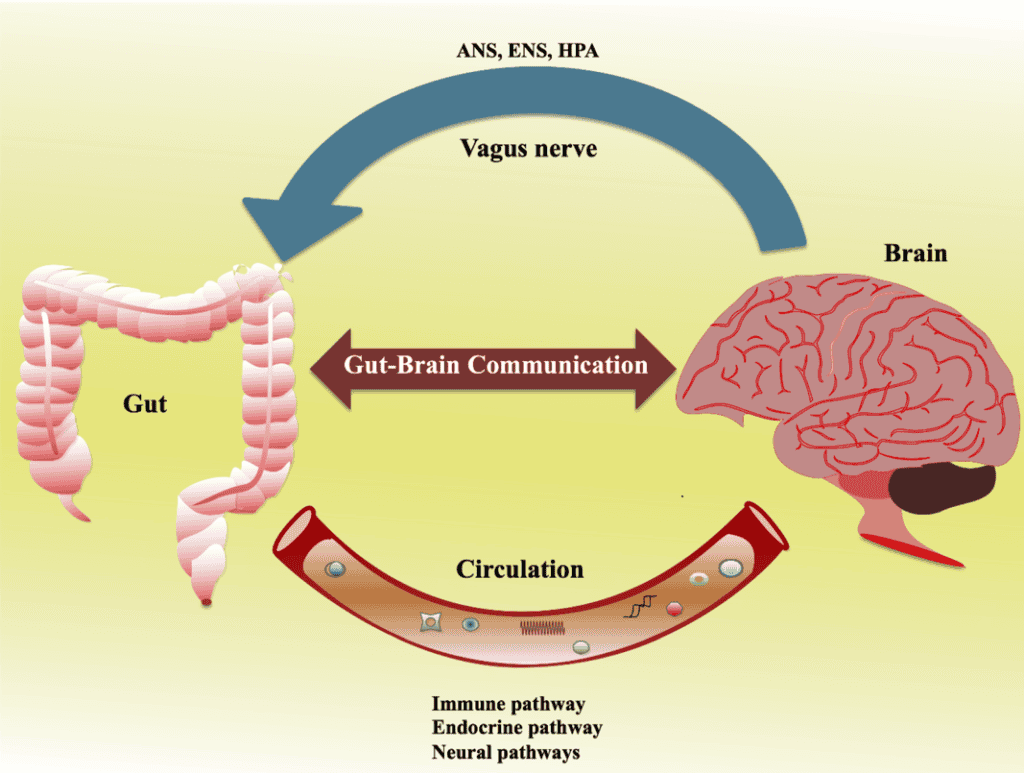When we talk about mental health, it’s difficult to avoid gut health. Both are dependent on each other. Recent discoveries have shown that the gut helps regulate emotions and has a huge impact on mood. Called as gut-brain axis, it can affect everything from anxiety and depression to cognition and memory. To understand more, here’s a guide on how your gut influences your brain activity and more.
In This Article
What Is the Gut-Brain Connection?
The gut-brain connection acts as a two-way communication between your gastrointestinal tract and central nervous system. It functions with the help of the vagus nerve, which sends messages between the gut and the brain. The other roles are played by hormonal pathways, immune system signaling, and gut microbiota activity. Because of this gut-brain axis, you suffer from various digestive stress symptoms like bloating, gas, and constipation.
Meet the “Second Brain”: Your Enteric Nervous System
The enteric nervous system (ENS) works as a second brain in your body. This aids in the digestive process, such as swallowing food and releasing enzymes to absorb nutrients. No, its function is not to think. The ENS simply communicates with Irritable Bowel Syndrome (IBS), which is responsible for emotional shifts, stress sensitivity, and sometimes depression.

The most fascinating thing here is gut irritation that can trigger your mood disorders. According to Johns Hopkins, 30-40% of the world’s population is experiencing bowel problems. Some of them are dealing with mood symptoms, too.
Gut Microbiome: Your Internal Mood Manager
Your gut has trillions of bacteria that make up the gut microbiome. These microbes will break down the food and lead to the production of key neurotransmitters like Serotonin, dopamine, and Gamma-Aminobutyric Acid. These chemicals can trigger your mood, motivation, and mental balance. It’s only during the imbalance of your gut health microbiome that brain fog, irritability, and low mood are noticed.
Signs of a Troubled Gut-Brain Connection
When your gut health is not going well, the body will react in many ways. You may face the following signs:
- Digestive issues like bloating, diarrhea, or constipation
- Sugar cravings
- Trouble focusing
- Mood swings or unexplained anxiety
- Constant fatigue
These symptoms show the poor gut activity and inflammation that can disrupt the messages that your gut passes to the brain.
How to Improve Your Gut Health for an Improved Mood?
There are many ways to strengthen your gut-brain axis and enhance mental health. Here are a few of them:
Add Gut-Friendly Vegetables
Keep foods enriched with fibres in your diet. Some of the best examples include Kale, Garlic, Leeks, and asparagus. These will enhance your gut health by nourishing beneficial bacteria. This is because Fibre is a probiotic that feeds gut microbiota and supports better immune function, and reduces inflammation.
Natural Probiotics for Digestion
Other than a fibre-rich diet, you should consume fermented food products. Yoghurt, kimchi, and sauerkraut are some of the natural probiotics that improves your digestive system. These live microorganisms take care of the gut health balance
Hydrated with Electrolytes
Your gut health can stay optimal when your body is adequately hydrated. It is important to take essential electrolytes like sodium, potassium, calcium, and others for digestion, too. One of the primary role these electrolytes plays is in muscle contractions to maintain fluid balance
Sleep Well to Reset the Gut-Brain Circadian Rhythm
While you are in sleep mode, your body synchronizes the circadian rhythms. It is closely associated with gut health. Any disruption in sleep patterns can affect the functioning of the gut microbiome. As a result, you will have to face increased inflammation and digestive issues.
Can Probiotics Improve Your Mood?
The obvious answer is yes because many studies have pointed to the reduction of anxiety and depression symptoms after taking probiotics. For now, researchers are studying more about the psychobiotics as a non-invasive treatment for mental health.
More and more researchers are working on understanding how the digestive system affects cognition, memory, and metabolic health. The end goal is always to facilitate mental health treatment.
Final Thoughts
So one thing is clear! Your mental health isn’t just in your head, but linked with gut health too. Taking a proper diet, hydrating your body, and getting enough sleep will reset your body. It can improve the way you feel, think, and perform every day. Thus, what you feed yourself will reflect on your mental health.
“If you found this article helpful, share it with your circle and follow PingShopping on social media”
Frequently Asked Questions
How do antibiotics affect gut health?
A course of antibiotics can significantly reduce diversity in your gut microbiome and allow certain less friendly species or yeasts to overgrow temporarily.
When should I see a doctor or specialist about my gut health?
You should seek medical advice if you have persistent or worsening digestive symptoms, such as unintentional weight loss, blood in your stool, severe pain, ongoing diarrhea or constipation, difficulty swallowing, or symptoms that wake you at night. Gut health is important, but self-diagnosing serious symptoms as “just microbiome issues” can delay necessary treatment, so it’s always safer to check early when something feels truly off.
Is there a single “best” gut-health diet everyone should follow?
There is no one-size-fits-all perfect gut-health diet because microbiomes, genetics, health conditions, and cultural preferences vary from person to person. However, research consistently supports certain principles: eating a variety of whole plant foods, emphasizing fiber, minimizing ultra-processed and very sugary foods, including some fermented foods if tolerated, and choosing healthy fats like those in nuts, seeds, olive oil, and fatty fish.
What are the biggest food mistakes that damage gut health?
Some of the most common dietary habits that harm gut health include eating lots of ultra-processed foods, sugary drinks, refined carbs, and artificial sweeteners, while getting very little fiber. Processed foods and high sugar intake can feed less beneficial bacteria and promote inflammation, while low-fiber diets “starve” the helpful bacteria that depend on plant fibers.





